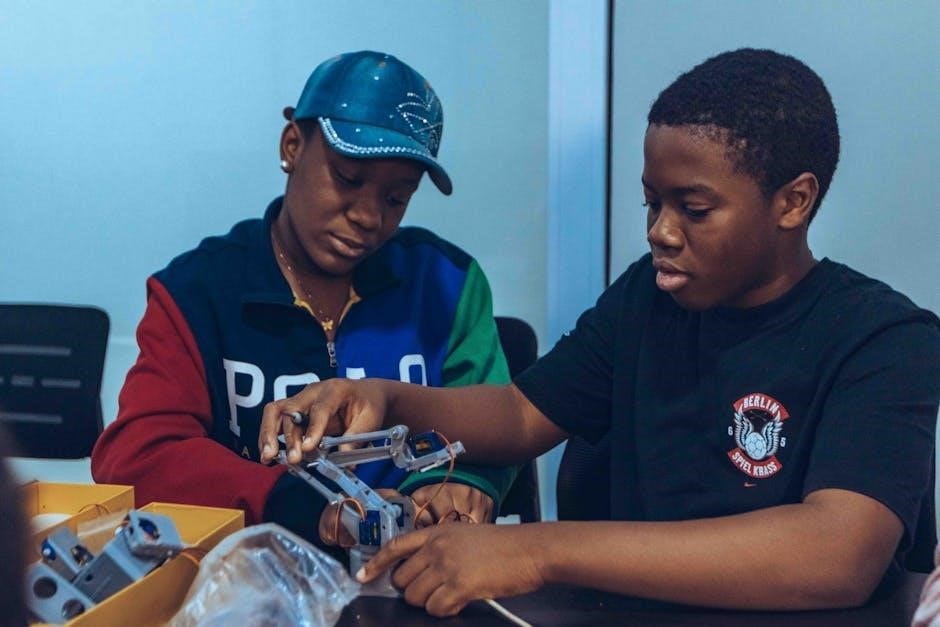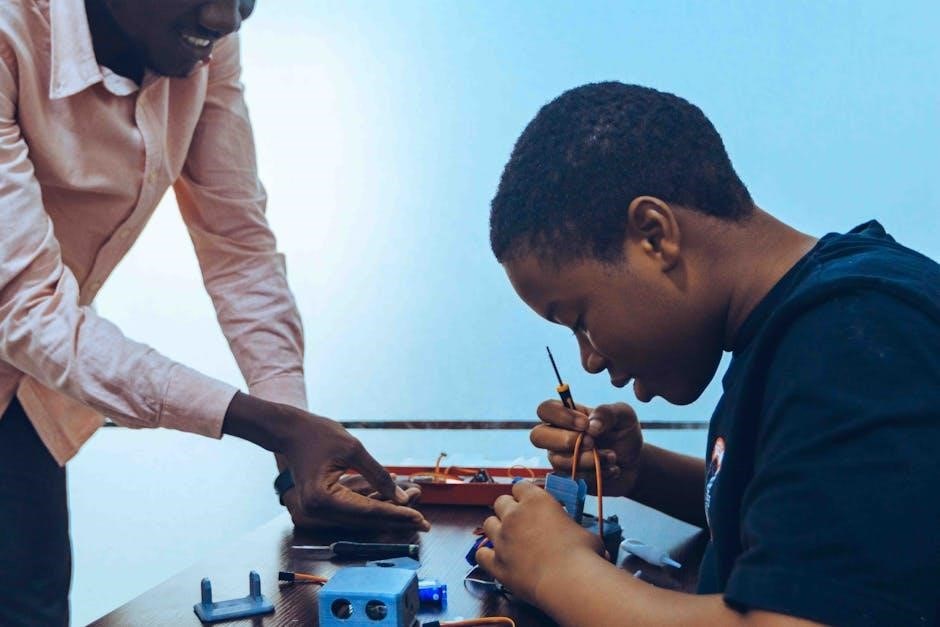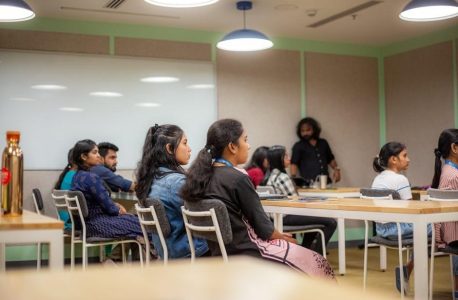The Instructional Skills Workshop (ISW) is a three-day intensive program designed to enhance teaching effectiveness for both new and experienced educators. It combines teaching practice, theory application, and topical sessions in a small group setting, fostering collaborative learning and evidence-based approaches to student-centered education.
1.1 Purpose and Benefits of the Workshop
The Instructional Skills Workshop (ISW) aims to enhance teaching effectiveness through micro-teaching, peer feedback, and reflective practice. It equips educators with practical skills to design engaging lessons, promote active learning, and assess student outcomes effectively. Participants gain confidence, improve their instructional strategies, and develop a growth mindset, ultimately fostering a student-centered learning environment and advancing their professional development as educators.
1.2 Overview of the Three-Day Intensive Program
The Instructional Skills Workshop is a three-day intensive program totaling 24 hours. It combines collaborative learning in a small group setting with a facilitator-participant ratio of 1:5. The program focuses on teaching practice, theory application, and topical sessions, emphasizing lesson planning, active participation, and feedback. Participants engage in videotaped micro-teaching and reflective discussions, fostering practical skill development and evidence-based teaching strategies to enhance instructional effectiveness and student-centered learning outcomes.

Key Components of the Instructional Skills Workshop
The workshop includes teaching practice, theory application, and topical sessions, focusing on evidence-based teaching strategies, collaborative learning, and reflective practices to enhance instructional effectiveness and student engagement.
2.1 Teaching Practice and Micro-Teaching
The workshop emphasizes teaching practice through micro-teaching sessions, where participants deliver short lessons to peers. This structured approach allows for immediate feedback, fostering reflective practice and improvement. Videotaped sessions enable instructors to critically analyze their teaching strategies, aligning them with student-centered learning outcomes. Micro-teaching helps build confidence, refine communication skills, and enhance the ability to engage learners effectively in diverse educational settings.
2.2 Theory Application and Evidence-Based Practices
The workshop integrates theoretical foundations with practical teaching strategies, emphasizing evidence-based practices. Participants explore educational theories and apply them to real-world teaching scenarios, ensuring alignment with contemporary pedagogical standards. This blend of theory and practice equips instructors with a robust framework to design engaging, effective lessons that promote active learning and cater to diverse student needs, fostering a deeper understanding of instructional design principles and their application.
2.3 Topical Sessions and Collaborative Learning
The workshop features interactive topical sessions that address key teaching challenges, such as lesson planning, active participation, and feedback strategies. Collaborative learning is encouraged through small group discussions, shared experiences, and problem-solving activities. These sessions foster a supportive environment where participants can explore innovative teaching methods, exchange ideas, and gain practical insights to enhance their instructional skills and adapt to diverse learning needs effectively.
Structure of the Workshop
The Instructional Skills Workshop is a three-day intensive program conducted in a small group setting with a facilitator-participant ratio of 1:5, ensuring personalized attention and collaborative learning.
3.1 Small Group Setting and Facilitator-Participant Ratio
The workshop is conducted in a small group setting with a facilitator-participant ratio of 1:5, ensuring personalized attention and fostering collaborative learning. This structure allows participants to actively engage in discussions, receive tailored feedback, and develop their teaching skills in a supportive environment. The small group dynamic enhances interaction and promotes the application of learning principles, making the experience more effective and meaningful for all involved.
3.2 Lesson Planning and Design Principles
The workshop emphasizes sound design principles, focusing on understanding learners’ needs and defining clear learning outcomes. Participants learn to plan lessons that prioritize the development of knowledge, skills, and attitudes. Through structured activities, they apply evidence-based strategies to create engaging and effective learning experiences, ensuring alignment between objectives, content, and assessment. This approach fosters intentional and impactful teaching practices, promoting continuous improvement in educational delivery.
3.3 Videotaped Micro-Teaching and Peer Feedback
The workshop incorporates videotaped micro-teaching sessions, allowing participants to deliver short lessons and receive constructive feedback from peers and facilitators. This reflective process helps identify strengths and areas for improvement, fostering professional growth. Participants engage in structured feedback discussions, promoting a deeper understanding of effective teaching practices and enhancing their ability to create engaging and impactful learning experiences.
Teaching Effectiveness and Student-Centered Learning
The Instructional Skills Workshop emphasizes enhancing teaching effectiveness through student-centered approaches, fostering active participation, and aligning lessons with learners’ needs to achieve desired educational outcomes.
4.1 Promoting Active Participation and Engagement
The Instructional Skills Workshop encourages active participation through collaborative learning and micro-teaching sessions. Participants engage in group activities, receive peer feedback, and reflect on their teaching practices. This approach fosters a dynamic environment where educators can refine their skills, promoting student-centered learning and enhancing overall teaching effectiveness.
4.2 Developing Knowledge, Skills, and Attitudes in Learners
The Instructional Skills Workshop focuses on helping educators design lessons that align with learners’ needs, define clear outcomes, and foster the development of knowledge, skills, and attitudes. Participants learn to apply sound design principles, ensuring their teaching practices promote deep understanding and practical application. This approach encourages learners to take an active role in their education, preparing them for continuous growth and real-world challenges.
4.3 Reflective Practice and Continuous Improvement
The Instructional Skills Workshop emphasizes reflective practice, enabling educators to critically assess their teaching methods and identify areas for growth. Through videotaped micro-teaching and peer feedback, participants engage in self-reflection, fostering a mindset of continuous improvement. This process helps educators refine their skills, align their practices with learner needs, and develop a growth-oriented approach to teaching, ultimately enhancing their effectiveness in the classroom.
Feedback and Reflection in the Workshop
Feedback and reflection are integral to the ISW, fostering growth through peer feedback, self-assessment, and videotaped micro-teaching. These practices encourage educators to refine their teaching strategies continuously.
5.1 The Role of Peer Feedback in Instructor Development
Peer feedback is a cornerstone of the ISW, enabling instructors to gain diverse perspectives on their teaching practices. Through videotaped micro-teaching sessions, participants receive constructive criticism, fostering reflection and growth. This collaborative process helps instructors identify strengths, address areas for improvement, and refine their teaching strategies, ultimately enhancing their effectiveness in the classroom.
5.2 Critical Reflection and Goal Setting
Critical reflection is a key component of the ISW, encouraging participants to analyze their teaching practices and identify areas for growth. By setting developmental goals, instructors can systematically improve their skills, aligning with lifelong learning principles. This reflective process, supported by peer feedback, empowers educators to refine their approaches and continuously enhance their teaching effectiveness in a structured and purposeful manner.
5.3 Using Feedback to Enhance Teaching Practices
The ISW emphasizes the use of feedback to refine teaching strategies. Through videotaped micro-teaching sessions and peer reviews, participants receive constructive insights to improve their instructional methods. This process fosters a culture of continuous improvement, enabling educators to adapt their approaches and enhance student engagement. By integrating feedback into their practice, instructors can address specific areas of development and achieve more effective learning outcomes for their students.
Technology Integration in the Workshop
The Instructional Skills Workshop integrates technology through tools like Brightspace, Collaborate Ultra, and Panopto, enhancing teaching and learning experiences with eLearning activities and digital resources.
6.1 Tools and Platforms for eLearning Activities
The Instructional Skills Workshop utilizes platforms like Brightspace, Collaborate Ultra, and Panopto to support eLearning activities. These tools enable interactive sessions, content sharing, and recording capabilities, fostering engagement and collaboration. They provide instructors with resources to design and deliver effective online lessons, ensuring a seamless transition to digital learning environments while maintaining high educational standards and promoting active participation among learners.
6.2 Using Brightspace, Collaborate Ultra, and Panopto
Brightspace, Collaborate Ultra, and Panopto are integral tools in the Instructional Skills Workshop, enabling instructors to design and deliver interactive eLearning content. Brightspace supports course design and content sharing, while Collaborate Ultra facilitates real-time virtual sessions. Panopto allows for recording and sharing of lectures, promoting flexible learning. These platforms enhance engagement, collaboration, and accessibility, helping instructors adapt to modern digital teaching environments effectively.
6.3 Technology Training for Instructors
Technology training in the ISW equips instructors with hands-on experience using Brightspace, Collaborate Ultra, and Panopto. These sessions focus on creating interactive eLearning content, facilitating virtual classes, and managing digital resources. Instructors gain confidence in integrating technology into their teaching practices, ensuring seamless delivery of engaging and accessible learning experiences for students in both online and hybrid environments.

Assessment and Evaluation in the Workshop
Assessment focuses on evaluating lesson plans, teaching practices, and participant progress. Continuous improvement is achieved through constructive feedback, ensuring instructors refine their skills and adapt to learner needs effectively.
7.1 Evaluating Lesson Plans and Teaching Practices
Evaluation focuses on aligning lesson plans with intended learning outcomes and applying evidence-based teaching methods. Participants’ practices are assessed through videotaped micro-teaching sessions and peer feedback, ensuring constructive criticism. This process helps refine teaching strategies, enhance clarity, and improve engagement, ultimately fostering a more effective and student-centered approach to instruction.
7.2 Assessing Participant Progress and Outcomes
Participant progress is assessed through lesson design, micro-teaching sessions, and peer feedback. Evaluations focus on alignment with learning objectives, clarity, and engagement strategies. Feedback highlights strengths and areas for improvement, ensuring continuous growth. Outcomes are measured by enhanced teaching confidence, improved instructional strategies, and the ability to create impactful learning experiences, ultimately contributing to more effective teaching practices and student success.
7.3 Continuous Improvement Through Assessment
Assessment in the ISW fosters continuous improvement by identifying strengths and areas for growth. Feedback from peers and facilitators guides iterative refinement of teaching practices. Reflective exercises help participants align their methods with learning objectives, enhancing their ability to engage students effectively. This cycle of evaluation and adaptation ensures ongoing development, leading to more impactful and student-centered teaching strategies over time.

Facilitator Training and Development
Facilitator training emphasizes peer training models and lifelong learning, equipping ISW facilitators with advanced skills to lead workshops effectively and support instructor development through evidence-based practices.
8.1 Trainer Training for ISW Facilitators
Trainer training prepares experienced ISW facilitators to lead workshops, based on a peer training model and lifelong learning principles. Designed by Doug Kerr, it assumes instructors within the system can dramatically improve teaching quality. This program equips facilitators with advanced skills to guide instructors effectively, fostering a culture of continuous improvement and evidence-based teaching practices.
8.2 Peer Training Model and Lifelong Learning
The peer training model in the ISW emphasizes collaboration and shared expertise among facilitators, aligning with lifelong learning principles. It fosters professional growth and continuous improvement, preparing educators to meet evolving teaching challenges. By integrating evidence-based practices, this approach ensures facilitators are well-equipped to enhance teaching effectiveness and align with global educational standards, creating a supportive environment for reflection and innovation.
8.3 Facilitator Skills and Responsibilities
Facilitators in the ISW are skilled educators trained to create an engaging and supportive learning environment. Their responsibilities include guiding participants through lesson planning, micro-teaching, and feedback sessions. They ensure active participation, promote reflective practice, and provide constructive feedback. Facilitators also model effective teaching strategies and maintain a focus on student-centered learning, fostering a collaborative atmosphere that encourages continuous improvement and professional growth among participants.

Challenges and Opportunities in the Workshop
The ISW addresses diverse learner needs, manages time effectively, and overcomes teaching barriers, offering opportunities for growth, innovation, and enhanced instructional strategies in a collaborative environment.
9.1 Addressing the Needs of Diverse Learners
The ISW emphasizes understanding diverse learner needs through sound design principles. Participants learn to define outcomes and plan lessons that develop knowledge, skills, and attitudes, ensuring inclusive and engaging experiences for all learners, fostering active participation and addressing individual differences effectively.
9.2 Managing Time and Resources Effectively
The ISW helps participants manage time and resources efficiently by focusing on structured lesson planning and prioritizing tasks. The program emphasizes the use of tools like Brightspace, Collaborate Ultra, and Panopto to optimize resource allocation, ensuring a balanced approach to teaching and learning while maintaining engagement and productivity in the classroom.
9.3 Overcoming Barriers to Effective Teaching
The ISW addresses challenges such as classroom management, engaging diverse learners, and adapting to technological demands. Through micro-teaching, peer feedback, and reflective practice, participants develop practical strategies to overcome these barriers. The workshop emphasizes evidence-based practices and collaborative learning, equipping instructors with tools to enhance teaching effectiveness and foster an inclusive, engaging learning environment for all students.

Outcomes and Impact of the Workshop
The ISW enhances teaching effectiveness, improves student learning outcomes, and fosters a community of practice among educators. Participants gain practical skills, confidence, and a growth mindset for continuous improvement.
10.1 Enhancing Teaching Effectiveness
The ISW equips instructors with practical strategies to improve teaching effectiveness. Through micro-teaching sessions and peer feedback, participants refine their skills in lesson planning, active learning techniques, and classroom management. The workshop emphasizes evidence-based practices, enabling educators to create engaging and inclusive learning environments. By fostering reflective practice, the ISW helps instructors develop a growth mindset, leading to continuous improvement in their teaching methods and student engagement.
10.2 Improving Student Learning Outcomes
The ISW focuses on improving student learning outcomes by equipping instructors with strategies to align lessons with intended outcomes. Participants learn to design engaging activities that promote active participation and foster deeper understanding. By applying evidence-based practices, educators create learning environments that support the development of knowledge, skills, and attitudes in learners, ultimately leading to better academic performance and increased student success.
10.3 Building a Community of Practice
The ISW fosters a community of practice by encouraging collaboration and shared learning experiences among participants. Educators engage in peer feedback, reflective discussions, and collective problem-solving, creating a supportive network for ongoing professional development. This community extends beyond the workshop, enabling participants to continue sharing strategies and resources, thereby enhancing their teaching practices and contributing to a culture of continuous improvement in education.

Frequently Asked Questions (FAQs)
The ISW is designed for educators seeking to enhance teaching effectiveness. No prerequisites are required, and participation is open to both new and experienced instructors.
11.1 Who Should Attend the Workshop?
The Instructional Skills Workshop is ideal for educators seeking to enhance their teaching effectiveness. It is designed for both new instructors looking to develop foundational teaching skills and experienced educators aiming to refine their practices. The workshop is particularly beneficial for those interested in adopting evidence-based teaching strategies and fostering a student-centered learning environment. Participants from various educational backgrounds and levels of experience are encouraged to attend.
11.2 What Are the Prerequisites for Participation?
Participants should have a basic understanding of teaching principles and a willingness to engage in collaborative learning. Prior teaching experience is beneficial but not required. The workshop is open to educators from various disciplines and levels of experience, including new instructors and seasoned professionals looking to refine their skills. A commitment to active participation and openness to feedback is essential for maximizing the workshop’s benefits.
11.3 How Is the Workshop Evaluated?
The workshop is evaluated through participant feedback, lesson plan reviews, and assessments of teaching practices. Peer feedback and self-assessment are integral to the process, ensuring continuous improvement. Evaluations focus on the effectiveness of teaching strategies, participant engagement, and the application of evidence-based practices. Feedback is used to refine teaching methods and enhance the overall quality of the workshop experience for future participants.

Future Trends in Instructional Skills Workshops
Future trends include integrating emerging technologies, expanding online and hybrid formats, and aligning with global educational standards to enhance accessibility and effectiveness for diverse learners worldwide.
12.1 Incorporating Emerging Technologies
The Instructional Skills Workshop increasingly integrates emerging technologies like Brightspace, Collaborate Ultra, and Panopto to support eLearning activities. These tools enhance teaching practices, enabling instructors to design interactive lessons and facilitate student-centered learning. Technology training is embedded into the workshop, ensuring participants are proficient in using these platforms. This integration not only modernizes instruction but also prepares educators to meet the evolving demands of digital education effectively.
12.2 Expanding to Online and Hybrid Formats
The Instructional Skills Workshop is expanding to online and hybrid formats, offering greater flexibility for participants. These formats incorporate eLearning tools like Brightspace and Collaborate Ultra, ensuring interactive and collaborative learning experiences. Online sessions provide accessible professional development opportunities, catering to diverse schedules and locations. This shift allows the workshop to reach a broader audience while maintaining its focus on teaching effectiveness and student-centered learning through structured, engaging activities.
12.3 Aligning with Global Educational Standards
The Instructional Skills Workshop aligns with global educational standards by incorporating evidence-based practices and collaborative learning. It meets international benchmarks for instructor development, ensuring consistency in teaching quality worldwide. The program integrates global perspectives, fostering a culture of continuous improvement and adaptability. By aligning with these standards, the ISW prepares educators to meet diverse learning needs effectively, promoting excellence in education on a global scale.

